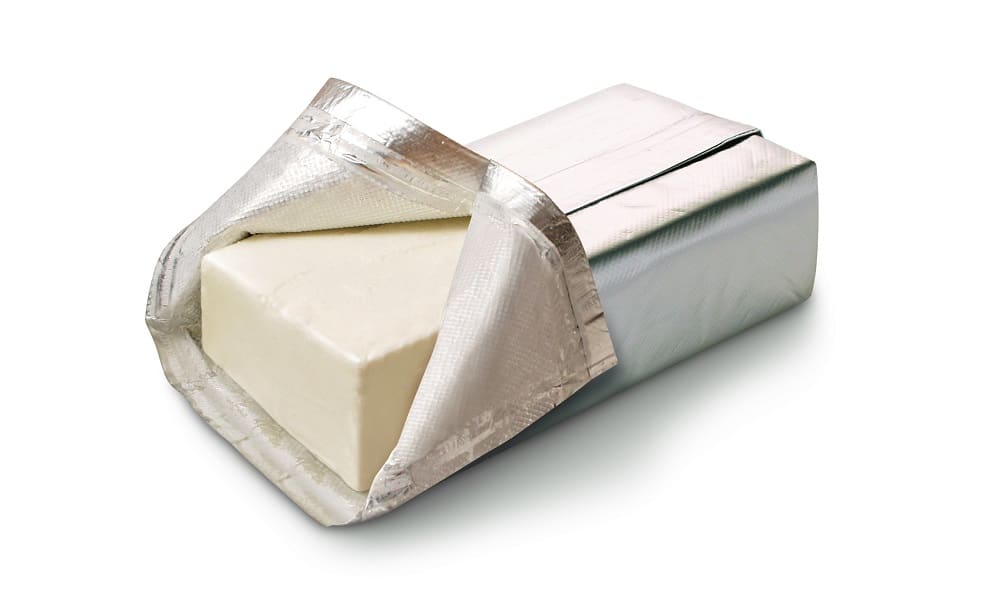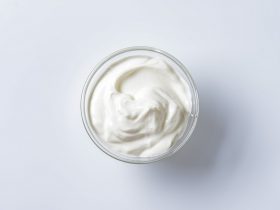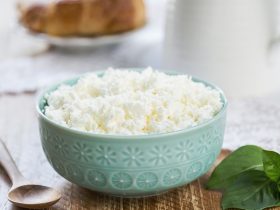Maternal nutrition during pregnancy is important for the health and development of a baby. A healthy diet during pregnancy has been found to be one of the most important factors for promoting improved health outcomes for both the mother and her newborn (Grenier et al., 2021).
In general, all types of food may be included in a pregnant woman’s diet, except in cases of food allergy, gestational diabetes mellitus, preeclampsia, or other illnesses or conditions (Achon et al., 2019). However, some foods have also been advised to be avoided because of their possible harmful effects to the mother and fetus.
Milk and other dairy products, due to their high nutrient density and bioavailability, can help pregnant women achieve their nutritional goals. They contain lots of nutrients, such as protein, calcium, phosphorus, potassium, iodine, vitamin B12, and riboflavin, among others (Achon et al., 2019). Cream cheese is a cheese spread made from pasteurized dairy. It is considered safe to eat while pregnant.
Consumption of Dairy Products in Pregnancy

The Society for Obstetricians and Gynaecology Canada released a consensus report in 2016 stating that women should consume a balanced and varied diet, including frequent intake of vegetables, fruits, whole grains, low-fat dairy, lean meat and fish, legumes, and nuts, while reducing intake of red and processed meat, and sweetened beverages. During pregnancy, the report also recommended that women should increase their caloric intake by 300 kcal/day starting second trimester through consumption of extra portions of nutrient-dense foods (Jarman et al., 2018).
The diet of a pregnant mother should be able to provide adequate stores of nutrients for appropriate fetal development and good health. A systematic review by Achon et al. (2019) included 17 studies that investigated on maternal milk and dairy intake during pregnancy and their effects on infant outcomes. Results showed a positive association between maternal milk intake and infant birth weight and length. Maternal dairy intake was associated with increased fetal growth in terms of fetal length, femur length and head circumference.
However, the same review found that the odds of delivering a large for gestational age (LGA) baby increased with maternal milk intake, with 59% higher odds among pregnant women who consumed more than 6 glasses of milk per day. Maternal milk and dairy intake were, likewise, associated with an increase in gestational weight gain (Achon et al., 2019).
Tanaka et al. in 2012 demonstrated that maternal nutrition during pregnancy may have an effect on fetal tooth development, formation and mineralization. They investigated maternal intake of cheese, in particular, during pregnancy as having an effect on the susceptibility for dental caries among their children.
In this study, 315 Japanese mother-child pairs were assessed through a diet history questionnaire. Between 41 and 50 months of age, the children were assessed as having dental caries if at least one primary tooth had decayed or had been filled. Results showed that increased maternal consumption of cheese during pregnancy was significantly associated with decreased risk of dental caries in children (Tanaka et al., 2012).
What is Cream Cheese?

Cream cheese is cheese made of cream. The cream is first pasteurized, heated to temperatures that kill potential pathogens. Then it is curdled by introducing lactic acid bacteria, which causes lowering of the pH of the cream, making it coagulate and separate into curds and whey. The whey is then drained off. Next, the curds are heated and added with stabilizers and thickeners that give cream cheese its smooth texture.
Cream cheese can also be made of cream and milk. Still, both cream and milk should be pasteurized first before they become ingredients for cream cheese.
Just like a lot of other cheeses, cream cheese has high fat content. Consuming too much cream cheese while pregnant can therefore increase the risk for complications like gestational diabetes.
Cream cheese also contains some amount of carbohydrates and protein. It is a good source of vitamin A and riboflavin (vitamin B2). Whipped forms of cream cheese contain fewer calories and less fat.
Is Cream Cheese Safe to Eat During Pregnancy
Since cream cheese is made from pasteurized dairy, it is generally safe to eat by pregnant women. The NSH website for England is the United Kingdom’s biggest health website. It states that semi-soft pasteurized cheese slices and spreads, such as cottage cheese, mozzarella, feta, paneer, ricotta, halloumi, and cream cheese are all safe to eat during pregnancy.
However, cream cheese has a short shelf life. Therefore it is recommended to be consumed within 2 weeks of purchase and before the stamped expiration date. The New South Wales (NSW) Food Authority even recommends cream cheese to be fully consumed within 2 days of opening its packaging.
Dairy Products to be Avoided During Pregnancy
Unpasteurized dairy products may contain Listeria monocytogenes, which are bacteria that cause the infection Listeriosis. Listeriosis is rare, but pregnant women are more susceptible.
Listeriosis in a pregnant mother can increase the risk of:
- Miscarriage
- Premature birth
- Neonatal infection
- Stillbirth
- Neonatal death
Filipello et al. in 2017 stated that listeriosis during pregnancy accounts for 20 to 43 percent of total invasive listeriosis in developed countries. They also said that being pregnant is associated with an 18-fold increased risk of developing the infection compared to the general population. According to their study, 29.7% of pregnancies associated with listeriosis resulted in fetal death.
Listeria is found in uncooked meats, uncooked vegetables, unpasteurized milk and products made with it, and processed foods. It is killed by pasteurization and cooking.
Therefore, the following dairy products should be avoided by all pregnant women (NSH website):
- Brie, camembert, chèvre – mold-ripened soft cheeses with white coating on the outside
- Danish blue, gorgonzola, Roquefort – soft blue cheeses
- Unpasteurized cow’s milk, goat’s milk, sheep’s milk, or any product made from them like goat’s cheese
Note: Hard cheeses like Parmesan are generally considered safe to consume during pregnancy.
Final Thoughts
Cream cheese is safe to consume during pregnancy as long as it is made from pasteurized cream or a combination of pasteurized cream and milk. Read the label to make sure that it does not contain any raw, unpasteurized dairy. Heating from pasteurization removes any possible presence of the bacteria Listeria monocytogenes, which may cause Listeriosis and lead to poor fetal outcomes.
Throughout pregnancy, it is recommended to maintain a diet that is nutrient-rich and balanced with various foods, such as fruits, vegetables, protein and fat sources. Cream cheese, too, can be safely consumed as an occasional treat.
References
- https://www.foodauthority.nsw.gov.au/
- https://www.nhs.uk/
- https://americanpregnancy.org/
- Grenier, L., Atkinson, S., Mottola, M., Wahoush, O., Thabane, L., Xie, F., Vickers-Manzin, J., Moore, C., Hutton, E., & Murray-Davis, B. (2021). Be healthy in pregnancy: Exploring factors that impact pregnant women’s nutrition and exercise behaviours. Maternal & Child Nutrition 17(1), e13068. doi: 10.1111/mcn.13068
- Jarman, M., Mathe, N., Ramazani, F., Pakseresht, M., Robson, P., Johnson, S., & Bell, R. (2018). Dietary patterns prior to pregnancy and associations with pregnancy complications. Nutrients 10(7), 914. doi: 10.3390/nu10070914
- Achόn, M., Úbeda, N., Garcia-González, Á., Partearroyo, T., & Varela-Moreiras, G. (2019). Effects of milk and dairy product consumption on pregnancy and lactation outcomes: A systematic review. Advances in Nutrition 10(Suppl 2), S74-S87. doi: 10.1093/advances/nmz009
- Tanaka, K., Miyake, Y., Sasaki, S., & Hirota, Y. (2012). Dairy products and calcium intake during pregnancy and dental caries in children. Nutrition Journal 11, 33. doi: 10.1186/1475-2891-11-33




